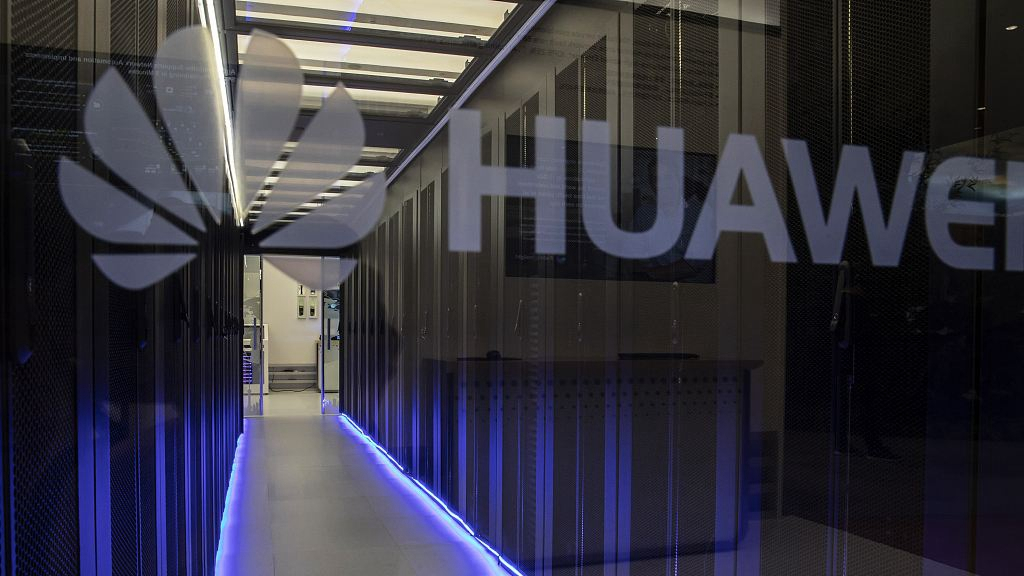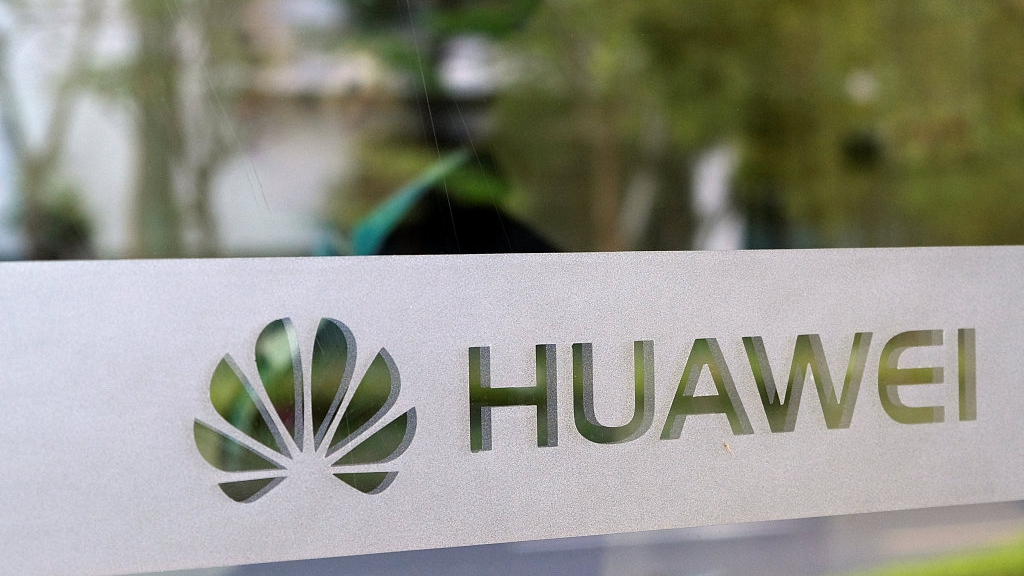
Huawei Technologies Co. logo is displayed on a glass wall in front of a cloud computing and server display in the exhibition hall at Huawei headquarters in Shenzhen, China, March 6, 2019. /VCG
Huawei Technologies Co. logo is displayed on a glass wall in front of a cloud computing and server display in the exhibition hall at Huawei headquarters in Shenzhen, China, March 6, 2019. /VCG
Editor's note: Ren Zheng is a Ph.D. student, majoring in American politics and international strategy, at the China Institute of Contemporary International Relations. The article reflects the author's opinion, and not necessarily the views of CGTN.
There should be no doubt that the most ironic thing at present is that while China is busy preventing the world from catching the COVID-19, the U.S. is busy preventing the world from getting access to the 5G technology of Huawei.
Following the Bureau of Industry and Security (BIS) order, which added a series of technical entities including Huawei to the 2019 blacklist category, the Trump administration is making a broader effort to restrict the flow of sensitive technologies to China in the beginning of 2020, weighing new moves such as halting General Electric's engine deliveries and limiting the use of American chip-making equipment, which will finally be discussed at a cabinet meeting on February 28.
In the name of protecting national security and American interests, the aggressive stance by the U.S. is accelerating the process of blocking China's access to American technology. Even if China and the U.S. have signed a phase one trade deal, it is really hard to predict the bottom line of its technology restriction plan.
As more and more doors for exchange of technologies and doing business are possibly closed off, it seems technological decoupling has been set on a path of continued escalation.
Escalation of decoupling will lead to 'Technical Iron Curtain'
Thanks to the great influence of the Cold War, the "Iron Curtain" takes its own place in history, pointing to the efforts by the Soviet Union (USSR) to decouple itself and its satellite states from an open contact with the West and its allied states, which is similar to the current decoupling efforts the U.S. is making to keep Chinese technology much out of the world in some degree.
Naturally, the escalating move of decoupling has been widely seen as the preface of a technical iron curtain. Goes this thinking, the technical version of Fulton speech can be changed like this, "From 'Blockade of 5G', 'Limit of semiconductor equipment' to 'Restriction of aircraft engine', new iron curtain has descended across tech between China and the U.S."

Ever since President Donald Trump took office in 2017, the Chinese tech industry has become a target of the White House over both security concerns and trade agreements.
As a Chinese telecom giant, who plays a leadership role in next-generation wireless standard called 5G, Huawei has gone through multiple battles, including the arrest of CFO in Canada, criminal charges in the U.S., ban on buying American components and exclusion of new infrastructure projects around the world.
Through reviewing what happened to Huawei, it is obvious that the White House is trying every effort to break ties with Chinese technology.
The technical divide pushed forward by the U.S. will not only widen the gap between China and the U.S., but also increase the differences between the U.S. and its allies.
Although the U.S. has warned Europe against embracing China's 5G technology, UK, its closest ally that is faced with an intense pressure to find alternatives to Chinese technology for 5G networks, still made the decision to let Huawei build non-core elements of sensitive 5G infrastructure.
Germany now appears ready to follow a similar path, despite endless appeals and threats from U.S. officials, as Nancy Pelosi, Speaker of the U.S. House of Representatives, issued a rebuke to European countries which are using Huawei to build 5G networks at the recent Munich Security Conference.
Choices of these countries hint that taking technical sides between the world's two superpowers will be a thing of the past, which suggests that new technical iron curtain bears little resemblance to the former one.
What if Technical Iron Curtain really comes forth?
First of all, the Technical Iron Curtain will interrupt the process of globalization, which has transformed the world economy with intertwined supply chains aimed at maximizing efficiency since the 1990s.
The escalating move of technical decoupling will ripple through the supply chain and world order, and transnational firms will require to manage the impact on the supply chain brought by the Technical Iron Curtain as some kind of geopolitical risk.
From the perspective of the international relations, if Technical Iron Curtain were to fall, confrontation and competition between China and the U.S. could continue for a long time, and the "iron curtain" might spill over from technology to other domains, such as economic and cultural.
Comparing the process of decoupling to iron curtain, it seems even harder to reverse from the latter to cooperative tolerance. Amid the iron curtain, the U.S will make the best use of its national power to stop a rising rival. In turn, the U.S. barriers against competitors will provoke Chinese retaliation. Actually, what has been happening recently generally indicates such progress from vague to clear.
With the tendency of technical curtain falling again, the history will enter a phase where the U.S. is not in a dominant position as before, where the rules, commitments and accepted ways of doing things are things of past cooperation. The question arises: how will cooperation go on in such circumstances?
(If you want to contribute and have specific expertise, please contact us at opinions@cgtn.com.)